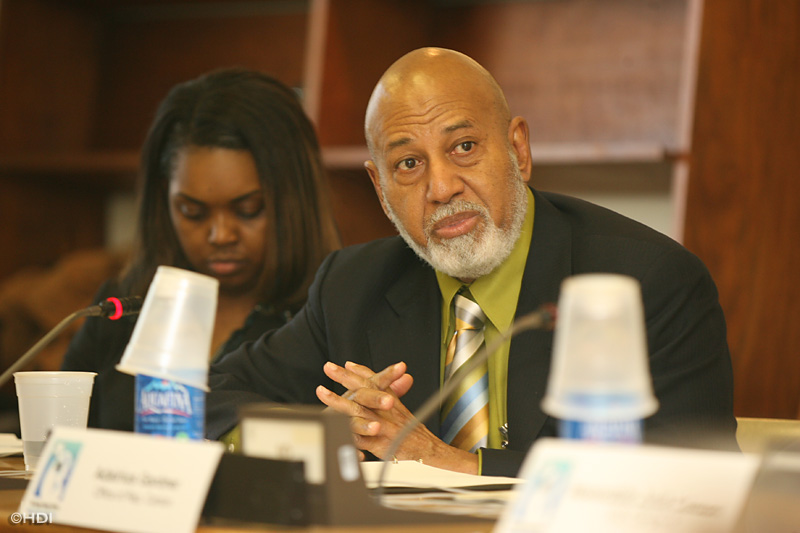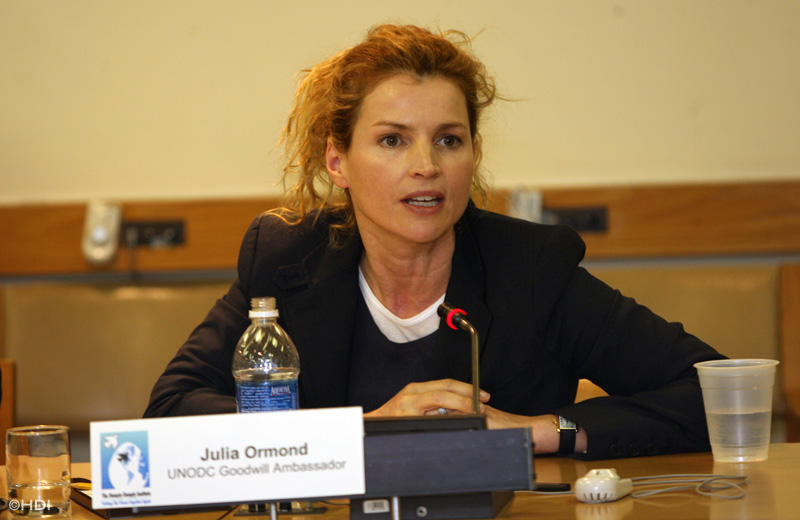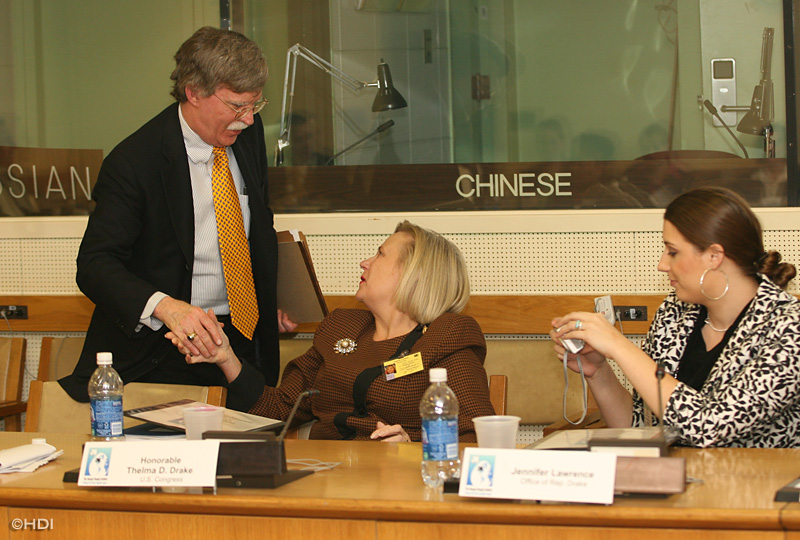Human Trafficking
The Humpty Dumpty Institute sponsored its 17th Congressional Delegation to the United Nations on March 13, 2006, which brought ten Members of the U.S. House of Representatives and their staff to New York for a day of meetings centered on the topic of human trafficking. This bipartisan delegation’s primary purpose in coming to the U.N. was to meet with senior U.S. and U.N. officials in order to discuss how the U.S. Congress can best coordinate anti-trafficking efforts with the U.N.
The bipartisan delegation met with U.N. Under-Secretary-General Chris Burnham, U.N. General Assembly President Ambassador Jan Eliasson, and U.S. Ambassador to the U.N. John Bolton. Delegates also met with senior representatives from the U.N. Office on Drugs and Crime (UNODC), the U.N. Fund for Women (UNIFEM), the U.N. Population Fund (UNFPA), and the U.N. Children’s Fund (UNICEF). UNODC Goodwill Ambassador Julia Ormond offered perspectives on the issue and urged action to fight human trafficking both on U.S. soil and internationally.
Executive Summary
The Humpty Dumpty Institute sponsored its 17th Congressional Delegation to the United Nations on March 13, 2006, which brought ten Members of the U.S. House of Representatives and their staff to New York for a day of meetings centered on the topic of human trafficking. This bipartisan delegation’s primary purpose in coming to the U.N. was to meet with senior U.S. and U.N. officials in order to discuss how the U.S. Congress can best coordinate anti-trafficking efforts with the UN.
The term “human trafficking” or “trafficking in persons” (TIP) refers to the practice of recruiting or transporting persons in order to place them in a situation of abuse or exploitation, such as forced prostitution or labor, and is often considered a form of modern-day slavery. The conditions of human trafficking often involve battering and extreme cruelty, sweatshop labor, or exploitative domestic servitude. Annually, approximately 600,000 to 800,000 people are trafficked across international borders; millions more are enslaved in their own countries. In the U.S. alone, between 15,000 and 18,000 people, mostly girls, are sold into slavery.
The bipartisan delegation met with U.N. Under-Secretary-General Chris Burnham, U.N. General Assembly President Ambassador Jan Eliasson, and U.S. Ambassador to the U.N. John Bolton. Delegates also met with senior representatives from the U.N. Office on Drugs and Crime (UNODC), the U.N. Fund for Women (UNIFEM), the U.N. Population Fund (UNFPA), and the U.N. Children’s Fund (UNICEF). UNODC Goodwill Ambassador Julia Ormond offered perspectives on the issue and urged action to fight human trafficking both on U.S. soil and internationally. Click here to listen to stories by U.N. Radio on this trip.
The Briefings
Chris Burnham, U.N. Under-Secretary-General for Management, welcomed the Congressional Delegation on behalf of Secretary-General Kofi Annan, and discussed the Secretary-General’s new report on overhauling U.N. management practices, entitled “Investing in the United Nations: For a Stronger Organization Worldwide.” Mr. Burnham addressed U.N. reform, specifically the creation of an ethics office, a new whistleblower protection policy, and an internal audit advisory committee to standardize accounting practices within the organization. Mr. Burnham also emphasized efforts to identify opportunities for outsourcing, such as printing and translation services, to streamline various reporting requirements into one annual report, to upgrade the U.N.’s New York campus to meet the city’s safety requirements as part of the U.N. Capital Master Plan, and to implement a new UN-wide computer system to increase efficiency.
Simone Monasebian, Chief of the New York liaison office of the U.N. Office on Drugs and Crime, and Julia Ormond, UNODC’s Goodwill Ambassador on Human Trafficking, spoke of UNODC’s role as the focal point within the U.N. system to combat human trafficking, as well as the close collaboration between the various U.N. agencies involved with trafficking and the U.S. Government, which has played a leading role throughout the world in fighting human trafficking. In her role as U.N. Goodwill Ambassador, Ms. Ormond spoke passionately about trafficking as a multi-dimensional threat to international peace and security, and urged the Congressional participants to generate the political will necessary to stop trafficking in all its manifestations. She noted that a holistic approach is required to combat this serious and complex problem: public awareness of the issue must be raised, police must be better trained to identify victims, and stronger legal mechanisms need to be created to make it harder to smuggle human beings across borders. Most essential, according to Ms. Ormond, is the need to fight global poverty, which provides fertile ground for human trafficking and other criminal behavior.
At a special working luncheon, HDI organized senior representatives from UNIFEM, UNFPA, and UNICEF – three of the key U.N. agencies involved in the coordinated effort to fight trafficking – to provide in-depth explanations on how the U.N. is working to prevent trafficking, protect at-risk people, and prosecute known traffickers.
Noeleen Heyzer, Executive Director of the U.N. Development Fund for Women (UNIFEM), informed the delegates on the particular issues facing women who are treated by many governments as criminals after being forced by extreme poverty or organized trafficking syndicates into prostitution. Ms. Heyzer also discussed the gender-based approach in responding to trafficking.
Hedia Belhadj, Deputy Director of the Technical Support Division of the U.N. Population Fund (UNFPA), spoke of the economic root of the world’s trafficking issues, with people migrating across borders out of economic desperation and finding themselves vulnerable to being physically and financially coerced into illegal activities.
Karin Landgren, Chief of Child Protection at the U.N. Children’s Fund (UNICEF), emphasized the specific problem of child trafficking and their efforts to protect children from exploitation as soldiers, laborers, and prostitutes. Thousands of children are forced into these illegal circumstances by parents who see no other economic choice, and by the criminal organizations that profit from these illicit activities.
During the discussion forum following these presentations delegates of both the U.S. Congress and the United Nations offered comments on the need to support small, localized initiatives to combat human trafficking, persuade national police forces to treat trafficked peoples as victims and not criminals, develop more thorough data tracking and statistic-sharing mechanisms worldwide, aggressively pursue and prosecute perpetrators of organized criminal trafficking, and inform the public of the U.S. and other U.N. member countries that this is a problem that has wide-reaching economic, security, and human rights implications.
Following lunch, the delegation met with Ambassador Jan Eliasson, President of the U.N. 60th General Assembly, who described human trafficking as a “modern form of slavery” and “a threat to human dignity” that can only be defeated through the collaborative efforts of the global community. The Ambassador also commended the United States for signing the protocols against smuggling and organized crime, thus strengthening the legal framework required to fight human trafficking. After discussing human trafficking, Ambassador Eliasson spoke more broadly about his commitment to human rights, calling it one of the three pillars of the UN, along with security and development. He expressed his belief that the proposed Human Rights Committee would be a significant improvement over the existing Commission on Human Rights, and was hopeful that the Security Council would provide its support for the new institution.
Ambassador John R. Bolton, U.S. Permanent Representative to the UN, finished the day by briefing the Congressional delegation on the priorities of the United States at the UN. He noted that the U.N. must more effectively discipline peacekeepers charged with sexual exploitation, in keeping with the organization’s zero-tolerance policy regarding such offenses. Ambassador Bolton reiterated the Bush administration’s concern with the atrocities occurring in Darfur. While commending the efforts of African Union troops, he commented that supplementing these forces with a U.N. peacekeeping mission could more effectively curtail the violence in Darfur. Finally, Ambassador Bolton discussed his efforts to strengthen the current proposal for a U.N. Human Rights Committee.
Schedule
Monday, March 13
10 am
Arrive New York LaGuardia Airport – Bus transport to UN
11 – 11:15 am
Welcome & Introduction
Ralph L. Cwerman, President of HDI
Location: Conference Room 9, U.N. Headquarters
11:15 – 11:45 am
Overview of U.N. Management Reforms
Chris Burnham, Under-Secretary-General for Management
Location: Conference Room 9, U.N. Headquarters
11:45 – 12:45 pm
Overview of U.N. Agency and Member-States Coordination
Simone Monasebian, Chief, U.N. Office on Drugs and Crime (UNODC)
Julia Ormond, UNODC Goodwill Ambassador for Human Trafficking
Location: Conference Room 9, U.N. Headquarters
1 – 2:30 pm
Working Luncheon: Case Studies of U.N. Agencies’ Activities to Combat Human Trafficking: UNIFEM, UNFPA, UNICEF
Location: U.N. Delegates Dining Room 6
Addressing Trafficking from a Gender Perspective – Noeleen Heyzer, Executive Director, U.N. Development Fund for Women (UNIFEM)
Advocacy & Capacity Building – Dr. Hedia Belhadj, Deputy Director of Technical Support Division, U.N. Population Fund (UNFPA)
Protecting Children from Trafficking & Exploitation – Karin Landgren, Chief of Child Protection, U.N. Children’s Fund (UNICEF)
2:45 – 3:30 pm
The Issue of Human Trafficking in the U.N. General Assembly
Ambassador Jan Eliasson, President of the U.N. 60th General Assembly
Location: Conference Room 9, U.N. Headquarters
3:30 – 4:30 pm
US Priorities at the United Nations
Ambassador John Bolton, U.S. Permanent Representative to the UN
Location: Conference Room 9, U.N. Headquarters
4:30 pm
Program Concludes
Participants:
Members of the House of Representatives, United States Congress
Rep. Juanita Millender-McDonald (D-CA), Co-Leader
Rep. Katherine Harris (R-FL), Co-Leader
Rep. Julia Carson (D-IN)
Rep. Barbara Cubin (R-WY)
Rep. Thelma Drake (R-VA)
Rep. Alcee L. Hastings (D – FL)
Rep. Sheila Jackson Lee (D-TX)
Rep. Eddie Bernice Johnson (D-TX)
Rep. Nita Lowey (D-NY)
Rep. Carolyn Maloney (D-NY)
Rep. Donald M. Payne (D-NJ)
Senior Congressional Staff
Jane Brodsky-Carlson, Office of Rep. Juanita Millender-McDonald
Adairius Gardner, Office of Rep. Julia Carson
Vanessa Griddine, Office of Rep. Alcee L. Hastings
Jennifer Lawrence, Office of Rep. Thelma Drake
Ashley Stow, Office of Rep. Katherine Harris
Landon Stropko, Office of Rep. Barbara Cubin
Andrea Taylor, Office of Rep. Juanita Millender-McDonald
Paloma Zuleta, Office of Eddie Bernice Johnson
United States Mission to the United Nations
Ambassador John Bolton, United States Permanent Representative to the United Nations
Ric Grenell, Spokesman, U.S. Mission to the United Nations
Travis Horel, Deputy Director, U.S. Mission to the United Nations – Washington Office
Millie Meyers, Director of Special Projects, U.S. Mission to the United Nations
Monica Cummings, U.S. Mission to the United Nations
United Nations
Dr. Hedia Belhadj, Deputy Director of Technical Support, U.N. Population Fund (UNFPA)
Chris Burnham, Under-Secretary-General, Department of Management
H.E. Jan Eliasson, President of the U.N. 60th General Assembly
Noeleen Heyzer, Executive Director, U.N. Development Fund for Women (UNIFEM)
Karin Landgren, Chief of Child Protection, U.N. Children’s Fund (UNICEF)
Simone Monasebian, Chief, U.N. Office on Drugs and Crime (UNODC), NY Office
Julia Ormond, UNODC Goodwill Ambassador for Human Trafficking
Observers
Will Davis, Director, U.N. Information Center – Washington Office
Deborah Derrick, Director, Better World Campaign
Susan Myers, Executive Director, United Nations Foundation – NY Office
Jay Snyder, President’s Commission on Public Diplomacy
Amir Dossal, Executive Director of the United Nations Fund for International Partnerships
Donald Steinberg, Vice President for Multilateral Affairs, International Crisis Group
The Humpty Dumpty Institute
Ralph L. Cwerman, President
William Rigler, Executive Director
Caroline Gosselin, Program Manager
Daniela Kempf, Program Director
Caitlin Fitzpatrick, Associate
Paul Romita, Associate
Karin Sosis, Associate
William Farrington, Photographer






















